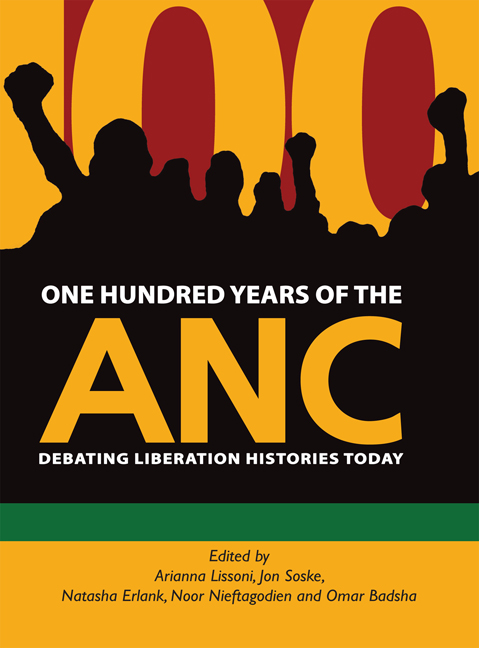Book contents
- Frontmatter
- Contents
- Acknowledgements
- Editorial Note
- FIRST KEYNOTE ADDRESS: Fragmentation and Cohesion in the ANC: The First 70 Years
- SECOND KEYNOTE ADDRESS: A Continuing Search for Identity: Carrying the Burden of History
- Chapter One One Hundred Years of the ANC: Debating Struggle History After Apartheid
- Chapter Two Religion And Resistance In Natal, 1900–1910
- Chapter Three Christianity and African Nationalism in South Africa in the First Half of the Twentieth Century
- Chapter Four Charlotte Maxeke: A Celebrated and Neglected Figure in History
- Chapter Five Imagining the Patriotic Worker: The Idea of ‘Decent Work’ in the ANC's Political Discourse
- Chapter Six Popular Movements, Contentious Spaces and the ANC, 1943–1956
- Chapter Seven Unravelling the 1947 ‘Doctors’ Pact’: Race, Metonymy and the Evasions of Nationalist History
- Chapter Eight The Politics of Language and Chief Albert Luthuli's funeral, 30 July 1967
- Chapter Nine Robben Island University Revisited
- Chapter Ten Shishita: A Crisis in the ANC in Exile in Zambia, 1980–811
- Chapter Eleven Comrade Mzwai
- Chapter Twelve Revisiting Sekhukhuneland: Trajectories of Former UDF Activists in Post-Apartheid South Africa
- Chapter Thirteen Regeneration of ANC Political Power, from the 1994 Electoral Victory to the 2012 Centenary
- Chapter Fourteen The ANC: Party Vanguard of the Black Middle Class?
- Chapter Fifteen Globalisation, Recolonisation and the Paradox of Liberation in Southern Africa
- Contributors
- Index
Chapter Twelve - Revisiting Sekhukhuneland: Trajectories of Former UDF Activists in Post-Apartheid South Africa
Published online by Cambridge University Press: 21 April 2018
- Frontmatter
- Contents
- Acknowledgements
- Editorial Note
- FIRST KEYNOTE ADDRESS: Fragmentation and Cohesion in the ANC: The First 70 Years
- SECOND KEYNOTE ADDRESS: A Continuing Search for Identity: Carrying the Burden of History
- Chapter One One Hundred Years of the ANC: Debating Struggle History After Apartheid
- Chapter Two Religion And Resistance In Natal, 1900–1910
- Chapter Three Christianity and African Nationalism in South Africa in the First Half of the Twentieth Century
- Chapter Four Charlotte Maxeke: A Celebrated and Neglected Figure in History
- Chapter Five Imagining the Patriotic Worker: The Idea of ‘Decent Work’ in the ANC's Political Discourse
- Chapter Six Popular Movements, Contentious Spaces and the ANC, 1943–1956
- Chapter Seven Unravelling the 1947 ‘Doctors’ Pact’: Race, Metonymy and the Evasions of Nationalist History
- Chapter Eight The Politics of Language and Chief Albert Luthuli's funeral, 30 July 1967
- Chapter Nine Robben Island University Revisited
- Chapter Ten Shishita: A Crisis in the ANC in Exile in Zambia, 1980–811
- Chapter Eleven Comrade Mzwai
- Chapter Twelve Revisiting Sekhukhuneland: Trajectories of Former UDF Activists in Post-Apartheid South Africa
- Chapter Thirteen Regeneration of ANC Political Power, from the 1994 Electoral Victory to the 2012 Centenary
- Chapter Fourteen The ANC: Party Vanguard of the Black Middle Class?
- Chapter Fifteen Globalisation, Recolonisation and the Paradox of Liberation in Southern Africa
- Contributors
- Index
Summary
Is the glass of liberation full, or merely half full; or perhaps, at best, half empty? In his prolific critical reflections on the outcome of southern Africa's struggles against colonial and racial domination, John Saul keeps reminding us that the struggle against apartheid had more ambitious goals than only to overthrow racial domination, although ending the horrors of apartheid was obviously the first priority. 1 To what extent has post-apartheid South Africa made progress towards a just society, not just in terms of race, but taking into account class, gender and democratic voice? As Saul points out, the answer will depend, crucially, on what was and is meant by liberation.
A vocal choir of academics and activists on the left has argued that the African National Congress (ANC) in government has sold out on its previous liberation ideals with its attempts to foster a politically connected black bourgeoisie, leaving millions of poor without the prospect of better life chances. Others adhere to the view that the ANC had, in fact, little room for manoeuvre once it had accepted the ‘racial bargain’ as the price for accessing state power: the white minority conceded political power on the understanding that it would (at least for the time being) retain control over major sectors of the economy, albeit with provisions for racial redress such as black economic empowerment (BEE).2 An admirably balanced perspective is presented in Susan Booysen's monumental book on the ANC's record as ruling party, listing the achievements without ignoring the many unmet promises.3 Booysen argues that the ANC doubles as ruling party and popular movement: as the ruling party it has largely transformed into a career machine, but without losing its popular legitimacy – yet.
In recording the views of ex-activists, my research aspires to contribute to this ongoing debate on the outcome of South Africa's liberation struggle. Obviously, most members of the struggle aristocracy have benefited immensely from the opportunities in post-apartheid South Africa, but did local-level activists also share in the fruits of liberation?
This chapter traces the careers and changing worldviews of former activists of the Sekhukhune Youth Organisation (Seyo) between 1990 and 2010. A rural youth organisation founded in the Lebowa bantustan (in the then Northern Transvaal) in the 1980s, Seyo was one of several hundred youth congresses that were affiliated to the United Democratic Front (UDF).
- Type
- Chapter
- Information
- One Hundred Years of the ANCDebating Liberation Histories Today, pp. 275 - 300Publisher: Wits University PressPrint publication year: 2012



